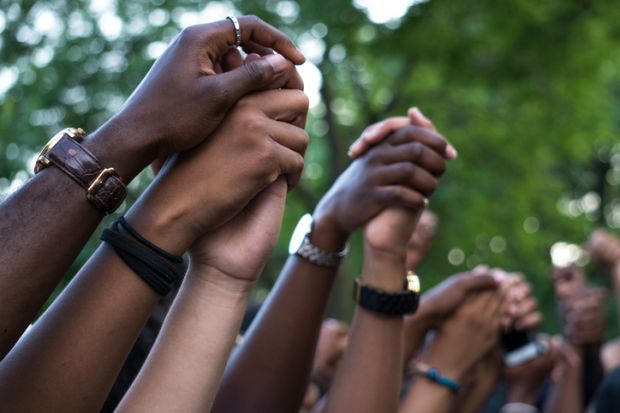Black, Asian and Minority Ethnic (BAME) academics are experiencing unparalleled societal stressors while simultaneously trying to meet new demands to become online educators. Black people continue to die daily, while Asians continue to be mercilessly attacked when minding their own business. The root of those experiences is, quite frankly, racism − and BAME academics are not immune.
For Black Americans, racism is also driving the disproportionate impact of the Covid-19 pandemic and fuelling “state-sanctioned anti-Black racial terror”. Meanwhile, the former US president created and weaponised the racist term “China virus”, which has been screamed at Asians during violent attacks. For BAME academics, those and similar experiences create the potential for a myriad feelings and negative mental health outcomes.
Before the abrupt pivot last spring, most faculty had never taught online. The imposed learning curve was daunting, but they rose to the challenge. They are doing their best to be responsive to students’ increased mental health needs; however, this recognition is often unilateral, and students sometimes forget that teachers are living in the same dual-pandemic world of Covid-19 and racism.
THE Campus resource: Anti-racist practice for digital and online learning
Pre-pandemic, as the only, or one of a few, BAME academics at their institution, many experienced loneliness or stress. Now, during the pandemic, all faculty face mounting pressure for perfect online instruction, and the lack of certainty about plans for the upcoming academic year is causing many to experience burnout, depression, frustration and dismay.
BAME academics are in an even more precarious position; many feel tired, terrorised and anxious because of the daily reminders of how little their lives seem to matter compared with white lives. The new barrage of expectations, coupled with pre-existing mental health stressors, could potentially increase the toll on their mental health. This must not be ignored.
In addition to these new demands is the exploitation of BAME academics for their knowledge of and experiences with racism, the oldest pandemic. University administrators must acknowledge that they frequently judge BAME faculty by different standards, including extra expectations and responsibilities reliant on the existence and persistence of white supremacist ideals in the academy.
University administrators must make structural changes to address inherent institutional biases, which can lead to not being awarded tenure or promoted (including to full professor). Universities must also stop using their BAME faculty to address their diversity goals or mentor their students of colour, and then not reward them for that work.
Universities must not expect their BAME academics to act as unpaid advisors on how to fix racism or serve as a “one-person minority affairs office”. Finally, they must recognise that BAME academics are not immune to current events and, in fact, may be experiencing them personally. Thus, expecting that they lead the university’s new anti-racism efforts is inappropriate, insensitive and tone-deaf.
Before universities can take steps to fix their problems, they need to understand them by learning and accepting history. BAME faculty in the US are not only academics, they are people who live in a country whose bedrock is racism.
Universities must then re-examine and redefine “productivity”, “success”, and “meaningful contributions” when assessing the work of BAME academics. For example, the National Institutes of Health haS repeatedly indicated that black researchers are less likely to be funded − a metric used in many academic institutions for tenure and promotion. This matters.
Administrators should know and assess their university’s history of recruiting and hiring BAME academics and admitting and graduating BAME students. Universities must honestly examine how they engage with and treat BAME communities, not JUST communities where they have financial investments. Failing to take even these basic steps indicates that the university finds little merit in its BAME academics and communities.
THE Campus resource: Expert Q&A on equity-first instruction
Universities need to discontinue promulgating a power narrative that allows white faculty to attack BAME academics and not be held accountable. Ultimately, feeling valued is essential to positive mental health. For BAME academics, being valued means being treated with the same dignity, worth and respect as their white counterparts.
Leadership must make certain that the shift to online education leaves faculty with stronger instructional skills, not simply feeling burned out. The pivot to remote learning has also unmasked the need to acknowledge and address the unrelenting mental health burden often experienced by BAME academics.
Ironically, faculty experiences of online teaching have provided universities with an unavoidable understanding of numerous overdue changes needed in the academy. Now, universities must prepare to take the next steps.
Henrika McCoy is interim associate dean for academic affairs and student services, and associate professor of social work at the Jane Addams College of Social Work, University of Illinois at Chicago.
Madeline Y. Lee is associate professor in the California State University San Marcos Department of Social Work.
Register to continue
Why register?
- Registration is free and only takes a moment
- Once registered, you can read 3 articles a month
- Sign up for our newsletter
Subscribe
Or subscribe for unlimited access to:
- Unlimited access to news, views, insights & reviews
- Digital editions
- Digital access to THE’s university and college rankings analysis
Already registered or a current subscriber? Login







